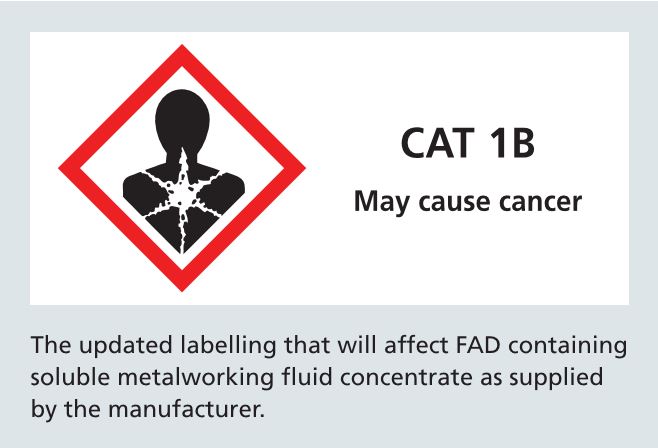Changes to CLP classification
Changes to our industry
Formaldehyde occurs naturally in the environment as a by-product of metabolic processes in humans, animals and through the natural decay process of plant species.
Formaldehyde is even detectable in human breath at low levels. Under the changes planned to the labelling of certain chemicals, formalin-releasing species have been re-classified according to their total potential to release formaldehyde and not through actual measurement in use.
Research by several chemical manufacturers supports very low levels, no higher than the surrounding environment, when used well managed metalworking fluid systems.
Formaldehyde has long been classed as a category 1B carcinogen. Formaldehyde Depots or ‘donors’ (FADs) have been used to improve the sump life of soluble metalworking fluids.
New legislation now affects certain formalin- containing biocides. Under the recent update to CLP regulation, ATP (Adaptation to Technical Progress, review May 4th 2017), any product or treated article which contains certain formalin-containing biocides (to protect the function of the product) will need to be labelled as category 1B. Examples of the biocides affected include methylene bis-morpholine (MBM) and methylene bis[5-methyloxazolidine] (MBO).

Changes for your lubricant provider
Changes to labelling are required to meet the new CLP (Classification, Labelling & Packaging) regulations adopted by the European Union. As a result, through no changes in product formulation, certain products will carry additional hazard labelling. The deadline for biocide manufacturers
to update their CLP Hazard labelling is 1st December 2018.
Changes will cascade down the supply chain to formulators (lubricant providers) who must update labelling on thein FAD containing preparations accordingly.
Under the updated CLP labelling regulations, products containing more than 0.1% or 1,000 PPM (parts per million) of these formalin-release type biocides (MBM and MBO) will carry the category 1B Hazard Identification.

Changes for the user
Under the updated CLP regulations, if certain FAD biocides are present at a concentration of 1,000 PPM or above, emulsions in use will carry the category 1B Hazard Classification in addition to the risks already associated with used metalworking fluids. This threshold will be exceeded during maintenance additions of MBO and MBM tank-side biocides.
Changes for the better
Our latest Global platform incorporates additives that are intrinsically robust and do NOT rely on FAD technology in the concentrate or from secondary sources e.g. through support from tank-side additions.
FUCHS is offering a proven alternative in terms of sump life with far greater operator safety. By sourcing additives which are REACH compliant, FUCHS is able to offer the most sustainable solutions to all users.
FAD-free chemistry
Using the latest, unique ECOCOOL platform chemistry, FUCHS R&D chemists and engineers have benchmarked our FAD-free alternative products against many competitors. Performance optimisation during the research and development stage includes extensive in-house testing using our own CNC machine tool. The ability to rigorously test in such a way is integral to the success of all FUCHS LUBRICANTS industrial products.
ECOCOOL FAD-free products are designed for use in both hard and soft water in a wide range of metalworking processes, allowing effective product rationalisation and a reduction in complexity for all industries (including aerospace).
Performance can be achieved in machining a variety of materials, including cast iron, stainless, Duplex and Super Duplex steels, titanium and its alloys and aerospace aluminium, along with the more widely used automotive aluminium alloys.
Our FAD-free chemistry has been developed to provide excellent levels of lubricity, cooling and corrosion protection.
FUCHS ECOCOOL FAD-free products have an enviable position in the industry and provide our most sustainable solution for the widest possible range of applications.
When using ECOCOOL FAD-free products, our customers report improved tool life, improved cleanliness, and excellent equipment sump life, all of which contribute towards improved process efficiency and reduced overall operating costs.

Contact us
Please contact us to discuss your specific application and product requirements, our team are available to advise and recommend in product selection.
Phone: +420 603 899 914
E-mail: richard.bor@fuchs.com
Innovative lubricants need experienced application engineers
Every lubricant change should be preceded by expert consultation on the application in question. Only then the best lubricant system can be selected. Experienced FUCHS engineers will be glad to advise on products for the application in question and also on our full range of lubricants.